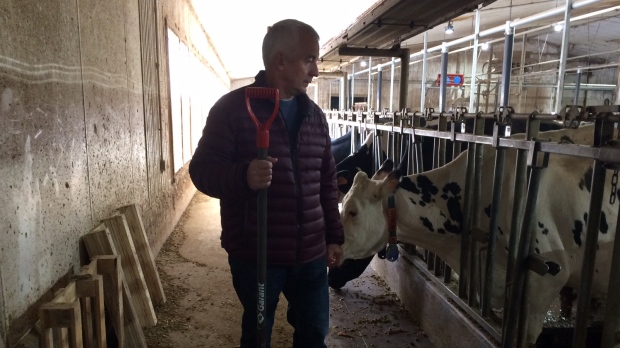-
Tips for becoming a good boxer - November 6, 2020
-
7 expert tips for making your hens night a memorable one - November 6, 2020
-
5 reasons to host your Christmas party on a cruise boat - November 6, 2020
-
What to do when you’re charged with a crime - November 6, 2020
-
Should you get one or multiple dogs? Here’s all you need to know - November 3, 2020
-
A Guide: How to Build Your Very Own Magic Mirror - February 14, 2019
-
Our Top Inspirational Baseball Stars - November 24, 2018
-
Five Tech Tools That Will Help You Turn Your Blog into a Business - November 24, 2018
-
How to Indulge on Vacation without Expanding Your Waist - November 9, 2018
-
5 Strategies for Businesses to Appeal to Today’s Increasingly Mobile-Crazed Customers - November 9, 2018
Donald Trump says new trade deal is ‘most important ever’
During a Rose Garden address Monday, the president said the United States-Mexico-Canada Agreement (USMCA) is the largest and most historic trade deal ever made.
Advertisement
Canada and Mexico will push to resolve the steel and aluminum tariffs over the next two months, leading up to the signing of the new USMCA deal, three people familiar with talks said, speaking on condition of anonymity. And the deal will need to be reviewed and renewed before a 16-year period ends, a major concession to Trump’s skepticism of free trade deals.
Canada gave up some access to its dairy, egg and poultry industries but will keep its agricultural supply management system and avoid punishing auto tariffs under the new deal.
The United States and Mexico want to push a deal they separately negotiated through their respective legislatures before Mexican President-elect Andres Manuel Lopez Obrador takes office on December 1.
They suspected that Canada, which had said it wasn’t bound by USA deadlines, was delaying the talks until after provincial elections Monday in Quebec, where support for Canadian dairy tariffs runs high.
The side letters say Canada and Mexico can continue sending about the same amount of vehicles and parts across the border free of charge, regardless of whether auto tariffs go into effect down the road. “The new name will be The United States Mexico Canada Agreement, or USMCA”, Trump wrote.
The pact preserved a key trade dispute settlement mechanism sought by Canada even as Ottawa agreed to open up its dairy markets to USA farmers.
For Trump, the agreement offered vindication for his hardline trade policies that have roiled relations with China, the European Union and America’s North American neighbors while causing concerns among Midwest farmers and manufacturers anxious about retaliation.
“It’s a good night for Mexico, and for North America”, added Mexican Foreign Secretary Luis Videgaray.
Meantime, congratulations were being offered among key stakeholders who have been on the edge of their seats waiting to see if Canada and the United States would find common ground.
Another element of the deal will exempt Mexican and Canadian cars from any future United States automotive tariffs up to certain import quotas.
Talks between the US, Canada and Mexico began last August after Trump called it “one of the worst trade deals in history”.
The office of the U.S. Trade Representative boasted that the deal would provide “new protections for U.S. intellectual property”, which the U.S. had been seeking.
Kind of. The major USA stock indexes showed gains this morning, with the Dow rising more than 250 points (a gain of almost 1 percent.) But Julia Coronado, an economist and the founder of the company MacroPolicy Perspectives, told us that while this market rally is probably a reaction to the agreement, the pact itself is rather “unimpressive”. On top of the substantive issues, Trump went out of his way to criticize the Canadian negotiating team in the final days of deliberations, which Trudeau can play up as a sign of just how hard his staff fought on this deal.
“In a sense, we look at this as something that does have a constructive message both for North American trade and for fears around trade wars more broadly”, Bruce Kasman, a JP Morgan economist, said.
One described the provision as allowing for “sharing information and giving a heads-up”, and denied that the U.S.is trying to bring Canada in line with its posture towards China: “I think we have our own approach to dealing with trade with China, and that approach is not determined by the approach of our partners in this particular agreement”.
In Ottawa, PMO officials said there would be another cabinet meeting Monday and a news conference likely as well. New measures will prevent Canada’s system from spilling outside its borders, while market access for the USA will exceed Canada’s concessions in Trans-Pacific Partnership talks, the US official said.
Advertisement
“Nearly all of the substantive work is finished, with a handful of details being ironed out, the sources said”, the Globe&Mail reports. “The heavy lift is going to be getting a trade deal through the next Congress in 2019 as well as ratification by Mexico’s new Congress and in Canada during a federal election year”. We also remain concerned about the remaining steel and aluminum tariffs.





























